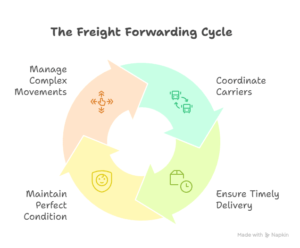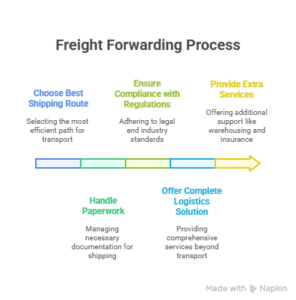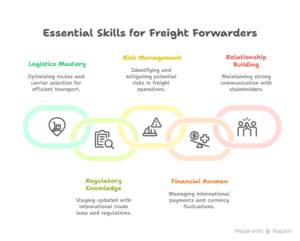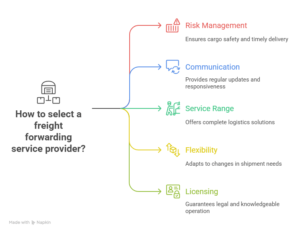How do the products you order from across the globe arrive at your doorstep without a jerk? The journey of these items is made possible by a service that powers global trade. In this blog, we explore the essential steps of the freight forwarding process and explain how these professionals simplify international shipping.
key takeaways
Freight forwarding simplifies global trade by managing every step of the shipping process — from export handling to final delivery — ensuring goods reach their destination safely and efficiently.
Freight forwarders offer complete logistics solutions, including customs clearance, warehousing, packaging, and insurance, making them vital partners for businesses engaged in international commerce.
Choosing the right freight forwarding partner matters, as their expertise in risk management, regulatory compliance, and communication directly impacts shipping efficiency and overall business success.
What Is Freight Forwarding?

Freight forwarding is the art of managing the transportation of goods from one location to another. By coordinating various carriers, including ships, aeroplanes, trucks, and trains it ensures that goods arrive on time and in perfect condition. Freight forwarding is the foundation of global logistics, managing these complex movements and ensuring everything works flawlessly.
What Freight Forwarders Do

Businesses usually depend on freight forwarders to uncomplicate the process. These professionals manage everything includes choosing the best shipping route to handling the paperwork, and ensuring compliance with regulations. Freight forwarding is not just about moving goods instead it’s about offering a complete logistics solution. Extra services such as warehousing, packaging, and cargo insurance provide businesses with a one-stop logistics partner.
The Skills of a Freight Forwarder
Freight forwarders must possess with a broad set of skills and expertise:

- Logistics Mastery: Understanding how to optimize routes and select the right carriers.
- Regulatory Knowledge: Staying updated with constantly changing international trade laws.
- Risk Management: Managing potential risks like damage or delays.
- Financial Acumen: Handling international payments and currency fluctuations.
- Relationship Building: Maintaining strong communication with all logistics stakeholders.
Freight forwarding is a role that demands both precision and adaptability in a global environment.
How Freight Forwarding Works

- Export Haulage: Goods are transported from the seller’s location to the freight forwarder’s warehouse.
- Export Customs Clearance: The freight forwarder works with customs brokers to meet export regulations.
- Origin Handling: Goods are sorted, prepared, and sometimes re-packaged for shipping.
- Import Customs Clearance: Upon arrival, the forwarder ensures customs duties and documentation are properly handled.
- Destination Arrival and Handling: Goods are unloaded, inspected, and readied for delivery.
Each step demonstrates how freight forwarding is a well-structured and essential process in international trade.
Evaluating a Freight Forwarding Partner
When selecting a service provider, you have to ask the right questions:

How they address risk management? Their policies on cargo insurance and delay handling are important.
How do they communicate? Regular updates and responsiveness are key.
What services do they provide? Freight forwarding is most efficient when the provider offers complete logistics, from customs clearance to warehousing.
Are they flexible? A good forwarder adapts to changes in shipment volume and timing.
Do they have the appropriate licenses? Credentials ensure a legal and knowledgeable operation.
The Role of Freight Forwarders
Freight forwarders wear many hats. Their responsibilities include:

- Shipment Tracking: Real-time cargo tracking for client peace of mind.
- Customs Brokerage: Guiding complex regulatory requirements.
- Warehousing: Offering storage before, during, or after transit.
- Negotiating: Securing the best rates and terms with carriers.
- Cargo Space Scheduling: Efficiently booking space based on the shipment’s specifications.
- Consolidating Freight: Combining smaller shipments to reduce costs.
- Supplying Cargo Insurance: Handling risks like damage, theft, or loss.
Freight forwarding is more than logistics. It involves strategic coordination, cost management, and risk reduction.
Conclusion
In summary, freight forwarding is an inevitable part of global trade. It simplifies international shipping for businesses, reduces logistical stress, and ensures goods move efficiently across borders. By partnering with a reliable provider like Triroute Shipping, businesses can enjoy smooth operations, timely deliveries, and secure growth in the global market.
To learn more about Freight Forwarding, explore our related blog articles!
- The Ultimate Guide to Freight Forwarding
- How Freight Forwarders Work on Simplify Global Shipping
- How Freight Forwarders Help Businesses Grow
- Freight Forwarding 101
- What are the benefits of freight forwarding?
- Choosing the Right Freight Forwarder
- Top Freight Forwarders in the Region
- The Future of Freight Forwarding






